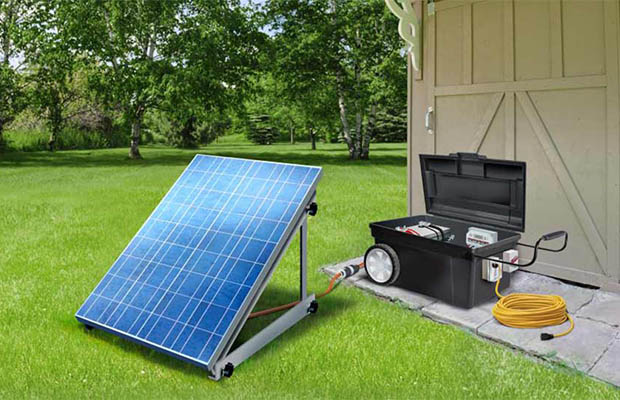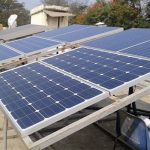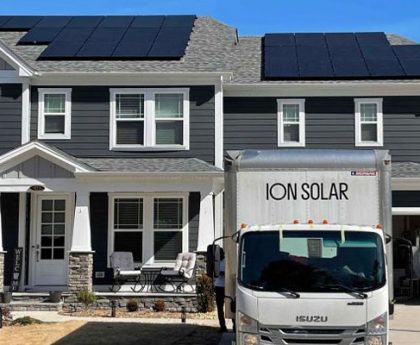It’s likely that you wished you had a generator if a hurricane struck and the power went out. A solar generator is a multipurpose device that combines a large-capacity rechargeable power source—basically, a big battery—with a set of portable solar panels. It can power your home in an emergency while also serving as a power source for off-grid activities like camping, tailgating, or even do-it-yourself projects in your yard.
The best solar generators for home can reliably and sustainably meet a variety of energy needs, and we’re here to help you find the right one for you. Keep reading!
Table of Contents
- Best Solar Generator For Home: Top Picks
- Best Solar Generator For Home In 2022
- 1. Best For Small Items: Jackery Portable Power Station Explorer 240
- 2. Best Handle: Rockpals Portable Power Station
- 3. Best Powerful: EF ECOFLOW Portable Power Station
- 4. Best Medium Output: Jackery Portable Power Station Explorer 500
- 5. Best For Camping: Goal Zero Yeti 500X Portable Power Station
- 6. Fastest Charging: EF ECOFLOW River Pro Portable Power Station
- 7. Best Charging Options: Maxoak Portable Power Station
- 8. Best Outlet Covers: Bluetti Portable Power Station
- 9. Best Durable: ITEHIL Portable Power Station
- 10. Best Portable: Rainier Outdoor Power Equipment Portable Power Station
- 11. Best Workable: Anker 545
- 12. Best Overall: Jackery Explorer 2000 Pro
- What Is Solar Generator?
- Advantages Of A Solar Generator
- What To Consider Before Buying A Solar Generator
- Our Verdict
- Frequently Asked Questions
Best Solar Generator For Home: Top Picks
- 1. Best For Small Items: Jackery Portable Power Station Explorer 240
- 2. Best Handle: ROCKPALS Portable Power Station
- 3. Best Powerful: EF ECOFLOW Portable Power Station
- 4. Best Medium Output: Jackery Portable Power Station Explorer 500
- 5. Best For Camping: Goal Zero Yeti 500X Portable Power Station
- 6. Fastest Charging: EF ECOFLOW RIVER Pro Portable Power Station
- 7. Best Charging Options: MAXOAK Portable Power Station
- 8. Best Outlet Covers: BLUETTI Portable Power Station
- 9. Best Durable: ITEHIL Portable Power Station
- 10. Best Portable: Rainier Outdoor Power Equipment Portable Power Station
- 11. Best Workable: Anker 545
- 12. Best Overall: Jackery Explorer 2000 Pro
Best Solar Generator For Home In 2022
1. Best For Small Items: Jackery Portable Power Station Explorer 240
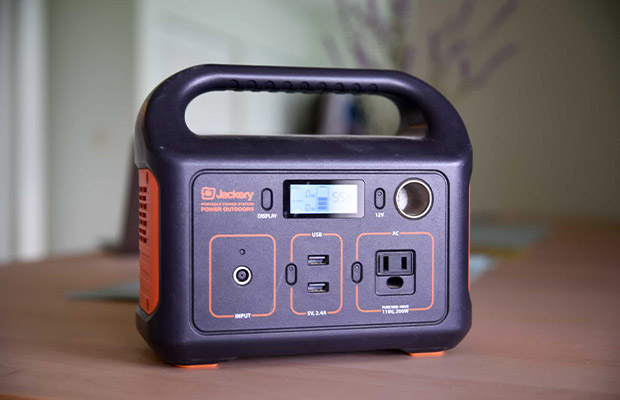
With a textured handle and a weight of under five pounds, this solar generator is portable. This generator’s ability to charge devices while being recharged and the fact that it can be recharged through a wall or car outlet make it particularly special.
Pros
- Has the most affordable price point out of the models in this review
- Can charge and recharge at the same time
- Has a built-in textured handle for easy carrying
Cons
- Criticized by some customers for dying quickly
- Has the lowest power output in this review at 200 watts
2. Best Handle: Rockpals Portable Power Station

This solar generator’s carrying handle is textured and rubberized, making it simple and cozy to hold onto. This generator can run laptops, lamps, hair dryers, and other small household appliances and electronics with its 300 watts and 280 Wh of power.
Pros And Cons
- Can be recharged using a cigarette lighter, three-prong wall outlet, USB port, or solar panel
- Has one fast-charging USB port
- Has enough power to provide about 40 charges to small home appliances
Cons
- Not sold with the DC converter
- Criticized for feeling cheaply made
3. Best Powerful: EF ECOFLOW Portable Power Station

Two of the six USB ports on this solar generator are fast-charging, ensuring that all of your essential electronics, including phones and lanterns, are always fully charged. For refrigerators, window air conditioners, and other large appliances, the generator offers up to 1,260-watt hours.
Pros
- Features patented X-Stream Technology to help it recharge faster
- Features two fast-charging USB ports and four standard ports for multiple charging options
- Can provide power to a laptop for over 25 hours
Cons
- Doesn’t have all of the ports and outlets on one side for easy access
- Noted by some that the wattage didn’t match the advertised output
4. Best Medium Output: Jackery Portable Power Station Explorer 500

With eight output ports and outlets and a 518-watt-hour output, this solar generator can charge a number of devices. Due to its small size and large carrying handle, it can also be taken along on a camping or hiking trip.
Pros
- Has the most affordable price point out of the models in this review
- Can charge and recharge at the same time
- Has a built-in textured handle for easy carrying
Cons
- Criticized by some customers for dying quickly
- Has a low power output of 200 watts
5. Best For Camping: Goal Zero Yeti 500X Portable Power Station

Due to its simple operation and 505 watt-hours of output, this generator makes a fantastic choice for campers. Additionally, it has four different port choices, including AC, 12V, and 60W USB-C PD, to guarantee that you can use a variety of devices outside without any issues.
Pros
- Can charge in a 180-watt wall outlet in three hours, a 60-watt outlet in 10 hours, or a 120-watt outlet in 4.5 hours
- Is made from rugged, durable material that’s perfect for on-the-go operation
- Can recharge a phone up to 42 times and a laptop up to 10 times
Cons
- Has a long auto shutoff timer
- AC outlet is sometimes slow to operate
6. Fastest Charging: EF ECOFLOW River Pro Portable Power Station
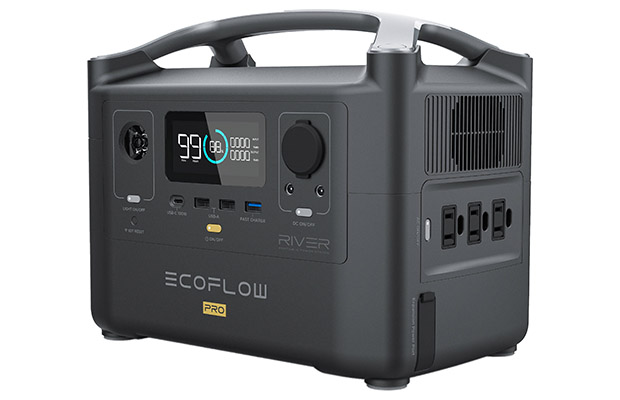
This solar generator is an affordable medium-sized option with 720 Wh and 600 watts of power. It can power some devices up to 1800 watts and charge up to 80% in just one hour. It weighs less than 17 pounds and has three AC outlets.
Pros
- Features 10 total output ports
- Includes a built-in flashlight
- Wi-Fi compatible
Cons
- Can be difficult to carry and transport
- AC sockets can occasionally be obstructed
7. Best Charging Options: Maxoak Portable Power Station
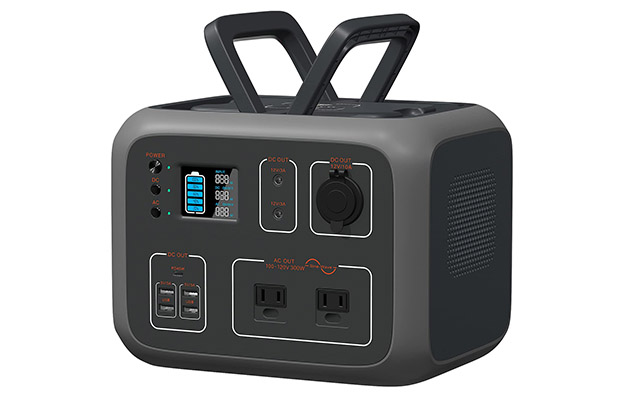
With its impressive eight ports—two AC outlets, one car outlet, four USB-A ports, and one USB-C port—this portable power station allows you to charge a variety of devices with less than 1,000 watts of power. Additionally, it comes in a variety of colors to suit your style.
Pros
- Can be charged up to 80 percent within 10 hours
- Features an intelligent cooling fan to prevent overheating
- Can charge a laptop up to 32 times
Cons
- Wall charger has a slower operation than some other models
- Is heavier than many other solar generators
8. Best Outlet Covers: Bluetti Portable Power Station

With 2,000 watt-hours, this solar generator has the capacity to power numerous strong devices simultaneously. The device is kept cool and quiet by an intelligent temperature-activated fan. All of its ports and outlets also have covers to keep them safe when not in use.
Pros
- Has a touchscreen to control its settings
- Includes a car charging cable
- Has small carrying handles on either side of its body
Cons
- Costs the most out of the options in this review
- Weighs 60 pounds, making it more difficult to transport than other models
9. Best Durable: ITEHIL Portable Power Station
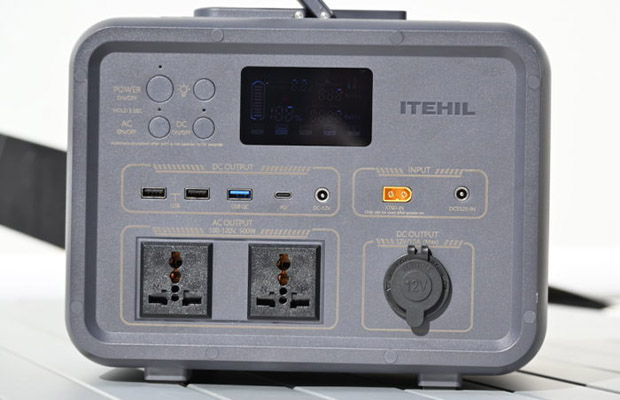
This powerful solar generator has additional protection and impact resistance thanks to the aviation-grade aluminum alloy used in its construction. Additionally, it has a strong LED light that will enable you to use it in the dark and a handy carrying handle that makes transporting it simple.
Pros
- Features multiple input and output ports that can reach over 700 watts
- Can be charged via a wall outlet, car outlet, or solar panel
- Includes an LED display and SOS rescue and warning features
Cons
- Does not include USB-C charging
- Does not feature Wi-Fi compatibility
10. Best Portable: Rainier Outdoor Power Equipment Portable Power Station
Small electronic devices like speakers, drones, lights, and smartphones can all be charged with this 150Wh generator. It is small enough to fit anywhere, weighs only five pounds, has a flashlight built-in, and is only six inches tall.
Pros
- Features three USB Ports, three 12V 5.5mm DC outputs
- Includes a battery-level display for easy tracking
- Has a lower price point than most other portable power stations
Cons
- Not ideal for charging large appliances
- Charging times can be inconsistent
11. Best Workable: Anker 545
The Anker 545 not only provides the small size and lighter weight you’re looking for when portability is a priority, but it also has a decent amount of power to boot. It’s easy to pack with camping equipment and move around without exerting too much effort because it’s about the size of a shoebox and weighs less than a case of beer.
However, you do have to give up some power in order to get something so lightweight. There is more than enough power in the Anker 545 to keep your devices charged with its 778Wh capacity and 770W output capacity. That should specifically provide about 55 phone charges, 10 for a laptop, or 38 for a camera. However, because the outlets only have a 500W maximum output, it is unable to power more demanding appliances like electric stoves or hair dryers.
Pros
- Lightweight and compact
- Plenty of capacity
- Built-in lights
Cons
- Slower input capacity
12. Best Overall: Jackery Explorer 2000 Pro
The Explorer 2000 Pro, the largest portable power station produced by Jackery, a leading solar generator manufacturer, offers an incredible 2,160 Watt Hours of power, which is enough to charge a complete camping setup for a few days. This portable power station can be completely charged in just two to two and a half hours when connected to six 200W solar panels, an improvement over the four-panel setup offered on the Jackery Explorer 1500. That’s significantly less time than the smaller model required.
It is also very user-friendly on top of everything else. You can plug in a variety of gadgets and electrical equipment because there are many output ports. Its features are extremely simple to use, and the digital display is simple to comprehend. It has a remarkable durability record, just like other Jackery generators. Its 43 pounds make it a little heavy for its size, which could be a drawback. Even so, the Jackery Explorer 2000 Pro will keep the lights on wherever you need power thanks to its ample power storage capacity and quick charging time.
Pros
- Fast charging and outstanding capacity
- Durable and easy to use
- Plenty of ports
- Can connect to six 200W solar panels
Cons
- Heavy for its size
What Is Solar Generator?
First off, a solar generator isn’t really a “generator.” It is a sizable rechargeable battery pack that integrates a surge-protected uninterruptible power supply (UPS), an inverter, and a line conditioner to power your AC devices. It is similar to the portable chargers you might carry around for your phone while traveling.
These devices are known as “solar generators” because they’re designed to be charged using a solar panel, making them suitable for long-term use in emergencies or off the grid (they can also be charged from a wall outlet). There are many different battery capacities available, ranging from large models that can keep essential appliances running and the lights on in an emergency to light models better suited for camping or tailgating.
Solar generators offer a variety of AC outlets, 12V DC ports, a typical cigarette lighter port, and 5521 barrel-type ports, in addition to Anderson power ports, to be able to power a variety of devices. A 125V 30A outlet for powering an RV may be available on more advanced, higher-power generators. To power AC circuits, some solar generators can connect directly to home generator transfer panels.
The USB ports on solar generators can be used to charge smartphones and other portable electronics. There are typically two to four USB ports on smaller units and up to six to eight on larger units, with a mix of USB-A 2.4V and 5V ports and USB-C with power delivery (PD) ports ranging in capacity from 18W to 100W.
Advantages Of A Solar Generator
When shopping for a new generator, there are several unique advantages to buying a solar generator instead of a gas-powered model, such as:
Noise Level
When used outside the home or while camping or RVing, standard generators can become quite noisy, which could be a big problem. However, since they lack any of the components found in gas-powered generators, one advantage of solar generators is that they operate completely quietly.
Maintenance
Additionally, the maintenance needed to run solar generators is minimal. Solar generators have fewer moving parts and are less likely to break than generators powered by fuel. A solar generator typically requires dusting, moisture removal, and connection inspection.
Fuel And Clean Energy
Solar generators have several advantages, one of which is the use of environmentally friendly, clean energy. Using solar generators can be more cost-effective as well because you won’t need to keep a large supply of fuel on hand.
What To Consider Before Buying A Solar Generator
Solar generator sales have skyrocketed in recent years. There are now dozens of different brands, most of which appear to be very similar at first glance. The truth is that among the sea of imitations, there are very few standouts. To make sure you’re getting a good one, consider the following.
How Much Energy Can It Hold?
The size of a portable solar generator does not necessarily indicate how much power it can store. Portable solar generators come in a very wide range of sizes. In reality, the majority of them are disappointingly insufficient and unable to hold much more power than a portable charger.
You must examine a generator’s watt-hour (Wh) capacity in order to properly assess its storage. One watt flowing for an hour is equal to one watt flowing for one hour. A few hundred to several thousand watt-hours are available from the best solar generators. But that doesn’t necessarily imply that it will last for a few hundred or a few thousand hours. Depending on what is plugged into any generator, it will ultimately last for a different period of time.
When you only use a generator to power one thing, its lifespan can be easily predicted. For instance, a 100-watt bulb would remain lit for 5 nonstop hours if powered by a power source with a 500-watt-hour capacity. You get the picture when you factor in your phone’s 18 watts per hour, a small fan’s 3 watts per hour, and a portable fridge’s 50 watts per hour. More capacity is always better.
Charging Capability
No solar generator can maintain a charge indefinitely, so you need one that can charge as quickly and easily as possible. This is where we put the “renewable” into “renewable energy.”
All of the power stations included in this roundup can be charged by connecting them to solar panels (hence the designation “solar generators”), but you also want to look for the ability to charge via other sources like wall outlets and your vehicle’s 12-volt plug. With this, you can be sure that you can recharge whenever you’re off the grid and in the sun, plugged in while cooking at home, or on the go via your dash socket.
The charging input capacity of a model, which is expressed in watts (W), is something else to pay attention to. The minimum that you should logically search for is a solar generator with a maximum input of 100W, for instance, which can accept continuous flows of up to 100 watts. A few 50- to 200-watt solar panels will be enough to fully charge the majority of the generators listed below, which have input capacities of at least a few hundred watts when charged by sunlight.
Output Capability
Power must continue to be brought in and used by solar generators. The best solar power systems can simultaneously charge all of your intended devices using any required plugs.
Any portable power source worth your money will have a high output capacity so you can charge numerous devices, even if they consume a lot of power. The maximum output of a generator should be much greater than its maximum input. Even though a specific model may only have a limited amount of input power available at any given time, it will typically output exponentially more power. For smaller tasks, you’ll need at least a 300 watt generator; for bigger jobs, you’ll need at least a 500 watt generator.
A wide range of output plugs, such as AC outlets, USB-A, USB-C, and even 12-volt DC outlets like the ones in your car’s dash, should be provided by the best solar generators. You can charge multiple devices simultaneously thanks to this, regardless of the plug type. It should have at least a few AC outlets and a few USB-A ports, though the exact number of ports you require will depend on how many devices you need to power.
Portability
Portable battery sources have been around for a while, but for the past few decades they have been fairly bulky, awkward objects. The fact that the newest solar generators are much more physically compact is one of the most exciting features of them.
Size and weight become crucial factors if you intend to bring a generator camping or incorporate it into a van conversion where every square inch counts. All of the items we’ve suggested are roughly the size of one or two shoeboxes, and at most three. The smallest one weighs about the same as a 24-pack of soda, while the heaviest one weighs 100 pounds, or about the same as an extra-large bag of dog food. The majority are in the 30 to 60 pound range.
Portability isn’t a major concern if you plan to use your generator as a more or less stationary source of backup power at home. You never know when you’ll need it for a purpose other than backup, but we still generally advise keeping weight and size in mind. (Moreover, if they don’t have to, who wants to carry something cumbersome and heavy?)
The need for accessories, which can affect how simple it is to move and use your generator, is another factor to take into account when it comes to portability. When you’re traveling or loading a vehicle, for instance, some generators may require a lot of removable battery packs. All of the items on our list need a few extras to function properly; for example, solar power cannot be generated without connecting cables and solar panels.
Durability
Durability and top-notch craftsmanship are crucial in any product you want to last for a long time. This is especially true if you intend to haul your generator along with you on camping and road trips. Many poor quality power plants are built with cheap parts and flimsy plastic that doesn’t seem like it will withstand the rigors of the road.
You can’t judge durability by reading a spec sheet online. In order to determine how well the generator performs, you must actually use it extensively. Through a combination of my own in-depth field testing and reviews collected from countless actual product owners, I have confirmed the longevity of these recommendations.
Read More:
Our Verdict
Given that we believe Jackery Explorer 2000 Pro to be the best all-around solar generator for homes, we will recommend it. Another good option is the EF ECOFLOW Portable Power Station. Which one will you pick?
Frequently Asked Questions
Are Solar Generators Worthwhile?
Depending on how you intend to use it, a solar generator might be worthwhile. If you live in an area with plenty of sunlight and use the generator’s energy as a home backup, the cost of the generator easily pays for itself. As an alternative, a solar generator is also worthwhile if you frequently take road trips.
Will My Solar Generator Have A Solar Panel Attached To It?
The model determines this. Some generators come equipped with the solar panels necessary to run them, while others do not. Find an all-inclusive kit if you don’t already have a compatible solar panel; this will reduce the cost and number of purchases.

